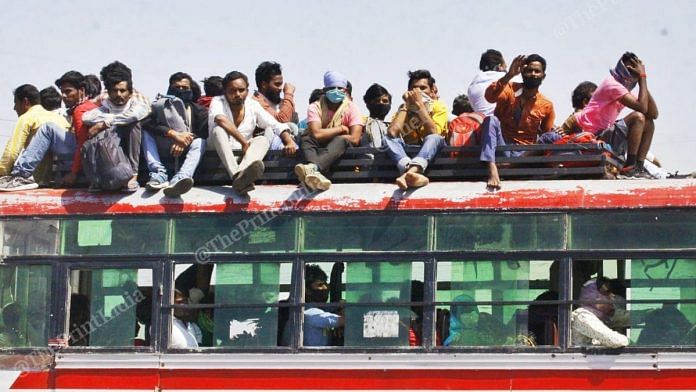
New Delhi: In three days’ time, the Narendra Modi government’s guidelines on allowing agricultural activities and select industries to resume operations in non-hotspots areas are set to kick in. But many states with a sizeable number of migrant labourers are still grappling with the problem of how to get them to work sites while ensuring that protocols to contain the novel coronavirus are not violated.
The central guidelines issued Wednesday allow select economic activities to resume from 20 April, in areas where there are no or a very low number of Covid-19 cases. However, with both inter-state and intra-state transport shut, the guidelines are silent on how workers will commute to their place of work.
Hundreds and thousands of migrants across states were left without livelihoods when the 21-day nationwide lockdown started on 25 March. Many left for their faraway villages on foot, while others were left stranded with little food or money on highways after borders were sealed.
Also read: Migrant crisis could’ve been averted if Modi’s One Nation One Ration Card scheme was ready
States in a quandary
ThePrint spoke to officials in over half-a-dozen states, who all agreed that transporting workers every day to factories or industries will be tough. “With public transport off the road and protocols to keep distance from each other, it will be a logistical challenge for the workers to commute daily. In many areas, the industries are located on the outskirts,” said a senior official in the Andhra Pradesh government.
In the absence of any directions from the Centre, states including Punjab, Maharashtra, Kerala, and Andhra Pradesh are considering different alternatives, like asking factory owners to provide for the accommodation of workers inside the factory premises.
Delhi, where nine of 11 districts are hotspots with a large number of Covid-19 cases, is yet to finalise its strategy.
“Delhi has a large chunk of migrant labourers, many of whom work in the informal sector. Without any concessions given to them, financial or otherwise, like arranging for their transport, it will be difficult to get them back to work,” said an official who did not want to be named.
Also read: My lord, migrant labourers need more than just food, just like we all do
Punjab’s plan
Punjab is considering allowing only those industries or small businesses to open which can house labourers within their premises.
A senior Punjab government official said there are close to 3 lakh migrant workers who are stranded in different districts of Punjab, and who could not return to their villages after the lockdown started.
K.B.S. Sidhu, Punjab’s Special Chief Secretary, told ThePrint: “Labourers can’t commute daily to work. Industries will have to provide accommodation to them if they want to resume operations. If they agree, they will be permitted to transport the workers to their work sites, once.”
Industries can arrange makeshift dormitories for the workers by maintaining adequate distance between beds, officials said.
Apart from providing accommodation, employers will also have to ensure that workers are screened before they enter the factories, and adhere to social distancing and other safety protocols.
Sidhu said the state government has started consultations with industries and manufacturing units to thrash out the modalities. “Only after the district administration is satisfied with the accommodation arrangements made by the industrial units that they will be allowed to open,” he added.
Also read: 20 men, 1 bucket and a Dettol soap cut in two — life in quarantine for UP migrant labourers
Similar proposals in Kerala and other states
Kerala, another state with a very high percentage of migrant workers, is also planning on similar lines.
Chief Secretary Tom Jose told ThePrint that transportation for labourers within the state or a district could be made available, but the industry will have to first arrange facilities to house them either within the premises, or nearby, if there are space constraints.
“People/industry can operate once they provide accommodation to the workers,” Jose said.
He added that the Kerala government is also going through demands made by the industry to give them financial concessions, such as tax holiday and interest holiday.
Maharashtra and Andhra Pradesh are consulting industry representatives for providing accommodation to labourers within the premises. “There are logistical issues. Many of them are small factories, which do not have much space. Ensuring that workers maintain social distance will be a challenge, leave alone providing boarding facilities,” said a Maharashtra government official.
Recommendations made to Modi govt
An empowered panel of secretaries has already recommended to the Modi government to give incentives and initiate measures to allow migrant workers to return from their native places, or wherever they are stranded, to metropolitan cities, so they can earn livelihood during the second phase of the lockdown.
The recommendation comes in the backdrop of growing concern in the government that if livelihood issues of the poor and migrant workers, who are dependent on their daily earnings, are not resolved, it could escalate into a law and order problem.
On 14 April, 1,000 migrant workers from Bihar, Uttar Pradesh, Jharkhand and other states gathered in large numbers in Mumbai, demanding they be sent back to their native places.
The incident happened hours after Prime Minister Narendra Modi announced the extension of the lockdown until 3 May.
There have also been reports of migrant workers indulging violence from cities like Surat in Gujarat.
Also read: Over 60% migrants don’t know govt measures in place for them to deal with lockdown: Survey

Corona being an health issue, and has no vaccine till date, it will be only logical for the government to advise people to be careful about their health voluntarily, since there cannot be a prolonged lockdown.
The governmens at Centre and States, should concentrate to set up hospitals for Corona treatment in every district, trained health workers, provide them with PPE, in the future.
More nutritious food be given to children and poor people, for improving their immunity system, on an ongoing basis.